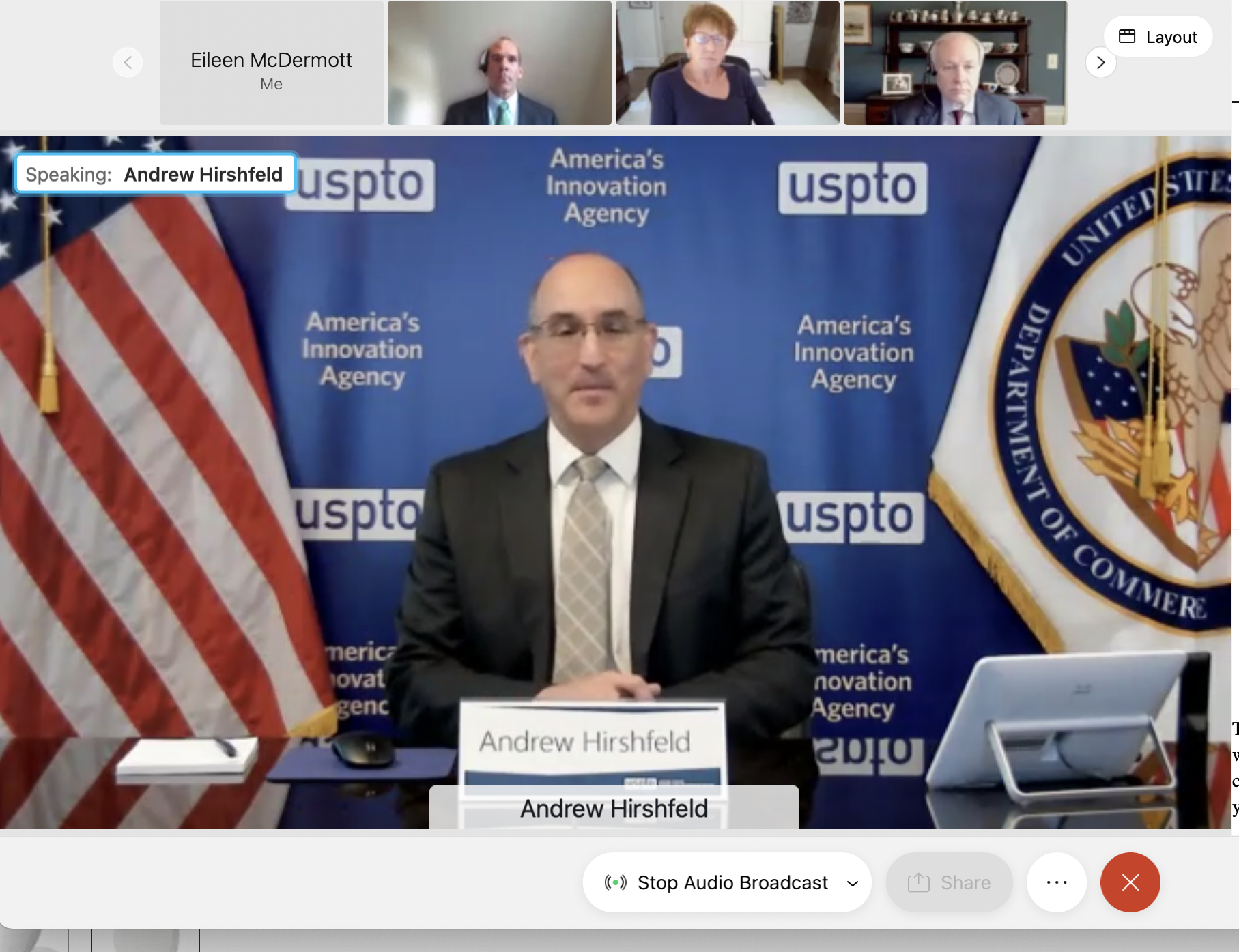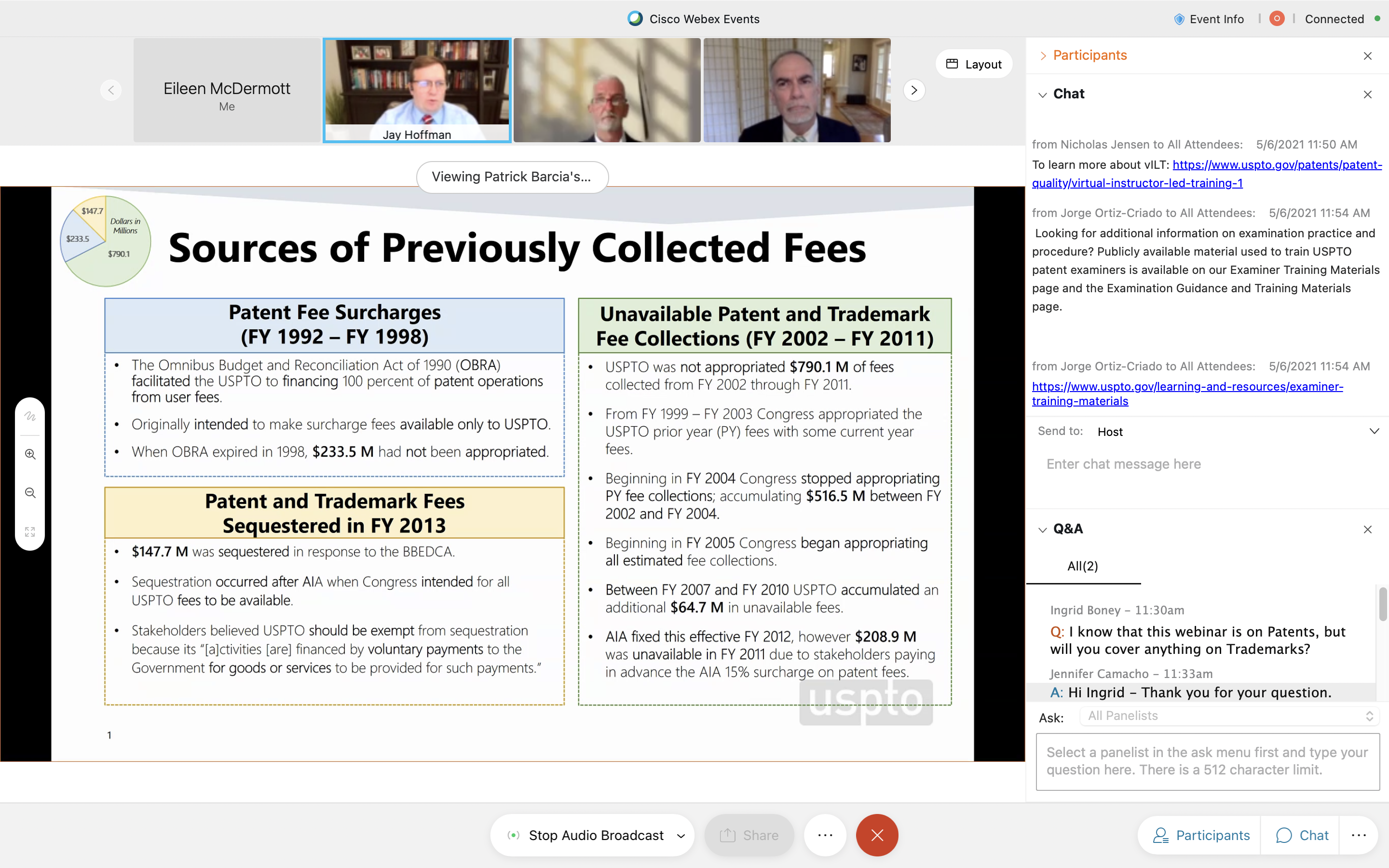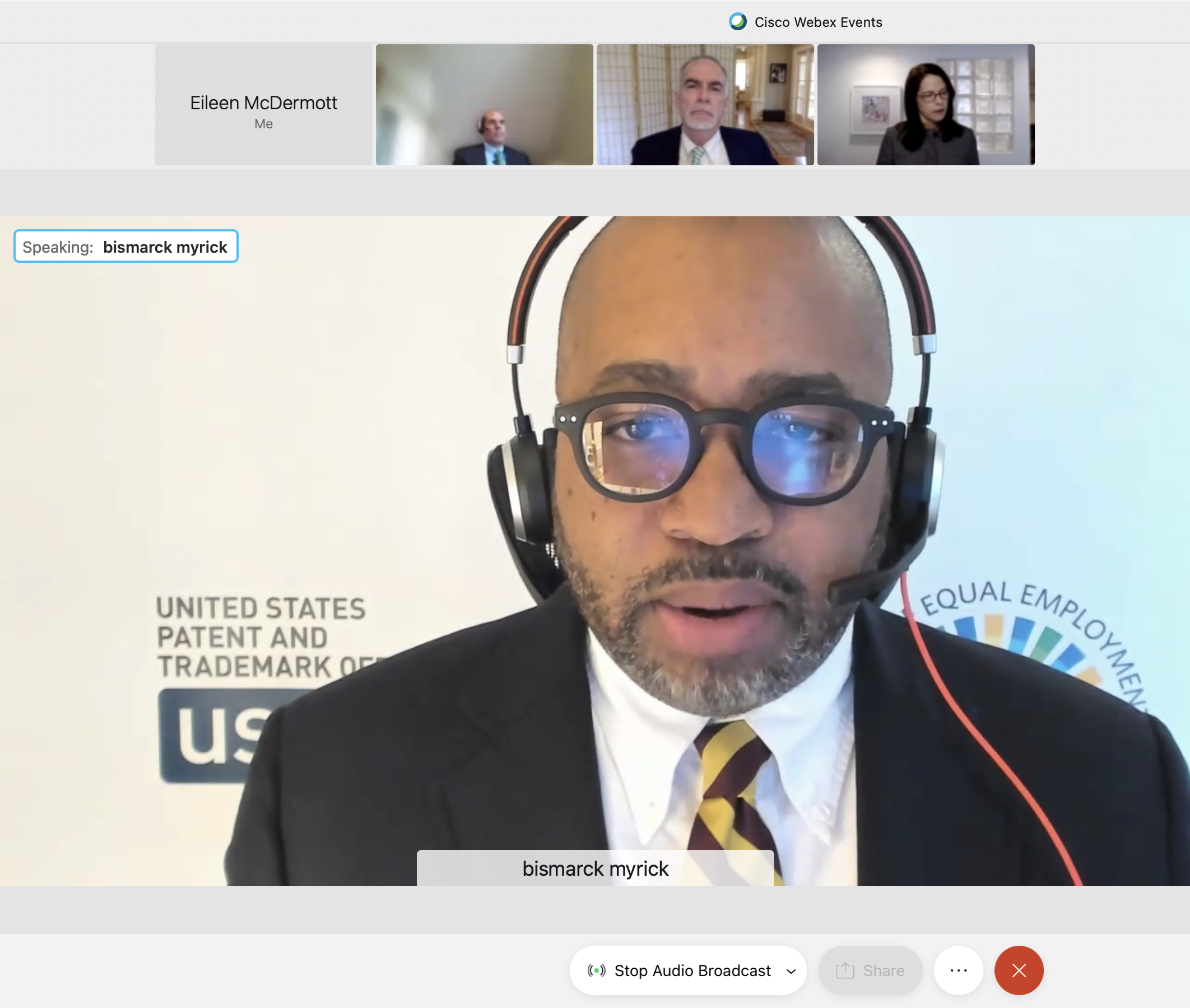
Acting USPTO Director Drew Hirshfeld
At the quarterly meeting of the Patent Public Advisory Committee (PPAC) on Thursday, Acting U.S. Patent and Trademark Office (USPTO) Director Drew Hirshfeld told attendees that patent filings are presently down 3.9% compared to the same time last year; the Office had projected filings would be down 3.7% for the year in the wake of the pandemic, but since filings have been coming in at a greater rate than expected in the last two months, the models now predict an overall 2% decrease for the year instead.
The Office’s fiscal health is also good despite a year of economic turmoil, and PPAC Finance Subcommittee Chair Bernard Cassidy said that the “overall financial position of the PTO is positive and stable.” Congress recently approved a request to spend the Office’s overage from last year, and the situation could get even better if previously collected fees are made available to the agency in the future.
There is presently $1.17 billion in user fees that were collected prior to the America Invents Act that has yet to be allocated to the Office. The money is in an account at the Treasury Department and has not been diverted, but the agency has been unable to use it.

USPTO Chief Financial Officer Jay Hoffman told the PPAC and attendees that there are several ways the Office could spend that money if allocated: IT updates to make the agency more accessible to small businesses and independent inventors; improving efficiency by implementing artificial intelligence (AI) tools; and limiting fee increases for an extended period of time. “These balances would strengthen the financial position of the agency,” Hoffman said.
The unused fees would also help the agency to implement initiatives such as those required under the IDEA Act, which recently passed out of the Senate Judiciary Committee. Hoffman explained: “As we try to expand the breadth of services, the money’s got to come from somewhere – either from the aggregate fees we’re currently collecting, or these previously collected fees.”
Cassidy added: “This is a topic we’ll have to pursue; we need to get the cooperation of Congress to put the fees in the hands of the PTO.”
PPAC Chair, Julie Mar-Spinola, also asked Hoffman whether he had considered the potential financial impact of the Biden Administration’s decision to support waiver of IP rights related to COVID-19 technology on the Office. Hoffman said he hadn’t, but offhand, the technology centers it would affect – while not insignificant – are not the largest revenue generators for the USPTO.
 Other topics addressed during the five-hour meeting included legislation relevant to the Office; Patent Trial and Appeal Board (PTAB) developments; AI initiatives; patent pendency and quality; and Office efforts to support President Biden’s Executive Order on advancing racial equality.
Other topics addressed during the five-hour meeting included legislation relevant to the Office; Patent Trial and Appeal Board (PTAB) developments; AI initiatives; patent pendency and quality; and Office efforts to support President Biden’s Executive Order on advancing racial equality.
With respect to the latter, USPTO Director of the Office of Equal Employment Opportunity and Diversity Bismarck Myrick said that he has been heading up efforts to comply with the Executive Order, which requires each agency of the government to conduct an equity assessment. The Administration has provided “an extensive questionnaire to identify areas where equity could be improved,” Myrick said. A Steering Committee is currently assisting each unit in conducting an audit, and preliminary information is due to the Department of Commerce by June 15.
On the topic of legislation the Office is monitoring, Acting Director, Office of Governmental Affairs and Oversight Kimberley Alton said that, in addition to the IDEA Act, the USPTO is closely watching developments on the Endless Frontier Act, which was reintroduced last month by Senate Majority Leader Chuck Schumer (D-NY), Senator Todd Young (R-IN), Representative Ro Khanna (D-CA), and Representative Mike Gallagher (R-WI). The bill looks at how to invest and retool federal agencies that have science and technology as key parts of their missions. One aspect of the bill would provide $10 billion for the creation of regional technology hubs. “That function aligns closely with the PTO’s work, so we will work closely with Commerce as the bill moves through Congress,” Alton said.

![[IPWatchdog Logo]](https://ipwatchdog.com/wp-content/themes/IPWatchdog%20-%202023/assets/images/temp/logo-small@2x.png)

![[Advertisement]](https://ipwatchdog.com/wp-content/uploads/2024/04/UnitedLex-May-2-2024-sidebar-700x500-1.jpg)
![[Advertisement]](https://ipwatchdog.com/wp-content/uploads/2024/04/Artificial-Intelligence-2024-REPLAY-sidebar-700x500-corrected.jpg)
![[Advertisement]](https://ipwatchdog.com/wp-content/uploads/2024/04/Patent-Litigation-Masters-2024-sidebar-700x500-1.jpg)

![[Advertisement]](https://ipwatchdog.com/wp-content/uploads/2021/12/WEBINAR-336-x-280-px.png)
![[Advertisement]](https://ipwatchdog.com/wp-content/uploads/2021/12/2021-Patent-Practice-on-Demand-recorded-Feb-2021-336-x-280.jpg)
![[Advertisement]](https://ipwatchdog.com/wp-content/uploads/2021/12/Ad-4-The-Invent-Patent-System™.png)






Join the Discussion
2 comments so far.
Anon
May 15, 2021 12:01 pmGeorge,
Even when you say things that I may agree with, you say them in such a ham-fisted manner as to make me shake my head.
What I agree with:
The US Grand Experiment with patents has ALWAYS strived to be one free from the Sport of Kings syndrome that had infected prior patent systems around the world, making those prior systems to be reviled as “Kingly favors.”
It is indeed in innovation’s best interest to provide for a WIDE OPEN FRONT GATE.
Often, people have confused “patent quality” with a desire to require ever-increasing INPUT quality. One aspect of such a view is to attempt to provide financial hurdles with the thought that if applicants had to pony MORE up front, and have an increased amount of skin in the game, then they would be more ‘careful’ about what they submit and the INPUT Quality driver would be met.
This though is a logical fallacy in view of what the US Grand Experiment has at its core. And one, that you yourself, George, fall prey to – even as your doing so contradicts your opening statement.
Improving patent quality is something that needs be done REGARDLESS of input quality. Quite in fact, systems that may be configured that are robust against variations in input quality (and instead, focusing on EXAMINATION quality) would ALWAYS be beneficial.
It would ALSO go towards improving ‘diversity’ and impact a Desired Ends of ‘Equity’ to have a wide open front gate. This does mean that coming in through that front gate would be MORE items that typify low quality input. That is simply the nature of the beast when one wants to HAVE a more inclusive system, one that is not money driven (as should be evident to all, having money MEANS having the means to develop higher quality inputs).
Further, under the true nature of equality (rather than the false ISMs of identity politics of equity), the nature of inputs being improved MUST NOT BE made a factor of RACISM, SEXISM, or any other ISM that would tilt the inputs towards a desired End Result. ALL End Results must be color blind, sex blind, and driven purely on merit. Equality of Opportunity is the OPPOSITE of Equity of Outcome.
I have nothing against a possible program of the USPTO to – in a colorblind manner – provide for an input augmentation phase (available to all) that could take an initial input (and would be most beneficial towards those less able to play the Sport of Kings) and provide feedback as to how to improve input. Such a program could include (but by no means be limited to) a ‘first-go’ prior art search with an explanation of patent fundamentals such as how the original inputs may be impacted by a legal analysis of the pertinent sections of 101, 102, 103, and 112. This could be provided at cost, or could use some of the EXISTING cost shifting mechanisms. This should be entirely non-publication based to align with the Grand Experiment’s original Quid Pro Quo ideals.
Additionally, and OUTSIDE of the patent system (and the attendant costs), the US COULD institute a high school level required course in innovation, and cover many if not all of the same type of ‘first go’ legal understanding. Making this a requirement at the high school level would provide a FAR BETTER appreciation of innovation and the view that it does NOT take a genius or a King’s ransom to entertain the thought that people (ordinary people) can partake in the innovation protection system.
To augment this type of ‘front end’ education and improved inputs (without playing the Sport of King’s game), I would love to see – as part of a larger effort across ALL litigation, since patent litigation is by no means the only area of litigation affected by costs – Right of Redress measures to make the courts more accessible.
On the patent portion of that ‘make more accessible’ I would also like to see patent rights – once duly granted – be made stronger, easier to enforce, and MUCH more difficult to challenge (with the difficulty NOT being tied to a ‘spend more to overcome’ type of mechanism). A VERY LARGE part of the problem – going to mindset and culture – is that the Efficient Infringer advocates have literally poisoned the minds of the public on enforcing one’s duly granted patent rights. The ‘boogeyman’ of “bad patents” and “Tr0lls” has sought the reverse of where we should be with the drive to make it EASIER to challenge patents, and this has had a necessary consequence of destabilizing patent value, with a perverse notion that with lower value and higher risk, the “game” is only worth the candle for larger scale (higher money) ventures. Lower perceived worth innovation need not apply. Those who cannot bankroll hugely expensive nigh-systematic nearly unending challenge mechanisms need not apply.
ALL of the mantras on “bad patents” serve Efficient Infringers and the attendant Sport of Kings.
A higher quality EXAMINATION system is the answer – with a higher quality EXAMINATION system, built to be robust against variable input, the output is MUCH more likely to be of the nature in which challenges to granted validity can be made much more difficult – if allowed to occur at all. Let’s NOT forget that ALL granted patents have a relatively short lifespan, so even those in error are of a limited time error basis. Heck I could even support a front end ten year period of incontestability so that AT THE ONSET when most small enterprises need it most, the risk of invalidation is removed, the value more certain, and as with most all business items of risk and value, capital will flow towards innovation under such circumstances, creating a virtuous circle.
What I disagree with:
“It is in taxpayers’ interest to support invention in this country. Why Congress can’t see that is truly baffling.
If taxpayers don’t have to pay to run the USPTO, then they won’t care about what goes on there, either. If taxpayers don’t care what’s going on there, then ‘bad things’ WILL happen there (they have to)! When oversight diminishes, corruption isn’t far behind.”
You show an alarming lack of understanding of the current corruption IN taxpayer based systems, and make a recommendation that is highly likely to end up with the very opposite of your stated goal. Quite in fact, losing the notion of the system being paid for by innovators will invite MORE of the Sport of Kings mindset and the abuse of innovators as a ‘profit center’ aspect of innovation will become a borrowing ground – through the tax allocation system – for all types of NON-innovation pet projects. It is imperative that we do NOT turn the patent system into an open and generic taxpayer run system.
“ What the U.S. should do instead is to charge very small application and issuance fees and ‘refund all of them’, if and when a U.S. applicant gets a patent approved! That would not apply to foreign filings. That would also discourage the filing of poor quality or frivolous applications that are then rejected, since no refunds would be provided in those cases.”
Here you fall to the ‘quality input’ trap and contradict yourself. How can you achieve BOTH a level of charging up front to “discourage poor quality or frivolous applications” AND charge very small application and issue fees?
You cannot.
Further, your mechanism contains the hidden trap of refund when granted which will have the opposite Sport of Kings effect in that those who CAN AFFORD the most expensive upfront processing will most obtain the refund, and you will induce an even more arduous “protect from poor quality” (of the WRONG type of ‘quality’) aims that REDUCE the likelihood that anyone BUT those who can afford a Sport of Kings would be able to afford the “necessary” quality levels of inputs. You could not be more wrong in the direction and intensity of the vector here.
“ The system we have now has become essentially unconstitutional and a violation of Americans’ ‘civil rights’ as intended in Article I.”
This is a mindless emotional rant devoid of any tie to or understanding of legal principles. It may “sound good” to you, but all that it does is lessen the persuasive ability of any of your other views.
I “get” the “motherhood and apple pie” flavor of why you assert this. I want you to know though, that on a legal forum, with readers versed in actual understanding of the Constitution (across all Articles), and an understanding of civil rights, your bombastic statement merely paints you as an uninformed rube.
As to your further rant of “The ‘Sport of Kings’ wasn’t created by the Founders or inventors. It was created by special interests (including lawyers) and an easily corruptible Congress.” – this is a somewhat painful mix of tinfoil and something that could be chewed on.
Certainly, Congress is corruptible, and I have LONG spoken on the need to diminish the power of the juristic person of Corporations and reduce the effects of such cases as Citizens United which only augment that ability to buy the favors of Congressmen.
But you make a series error in attempting to impugn all attorneys in your effort to label such as merely “special interests.” THAT is like chewing on tinfoil, and simply ignores the fact that many champions of innovation ARE attorneys.
George
May 10, 2021 05:30 pmUser fees should be almost ‘zero’ if the U.S. really wants to encourage more innovation. It is in taxpayers’ interest to support invention in this country. Why Congress can’t see that is truly baffling.
If taxpayers don’t have to pay to run the USPTO, then they won’t care about what goes on there, either. If taxpayers don’t care what’s going on there, then ‘bad things’ WILL happen there (they have to)! When oversight diminishes, corruption isn’t far behind.
What the U.S. should do instead is to charge very small application and issuance fees and ‘refund all of them’, if and when a U.S. applicant gets a patent approved! That would not apply to foreign filings. That would also discourage the filing of poor quality or frivolous applications that are then rejected, since no refunds would be provided in those cases.
We need to encourage more ‘high-quality’ invention (especially by individuals) not less and less of it. This is now declining as a direct result of endlessly increasing costs. 95%+ of Americans will ‘now’ never be able to afford to get an ‘enforceable’ patent on an idea they may have and 99% will never even make any money on patent that’s allowed.
This wasn’t the case 100 years ago! 100 years ago it was still feasible for almost any American to get a patent and make at least some money from it (if they had something of value to contribute).
The system we have now has become essentially unconstitutional and a violation of Americans’ ‘civil rights’ as intended in Article I. The Constitution didn’t mention ‘fees’ of any kind (much less exorbitant ones) to exercise those rights. Corporations and monopolies pushed hard for higher and higher fees and litigation expenses, so as to undermine those rights. The ‘Sport of Kings’ wasn’t created by the Founders or inventors. It was created by special interests (including lawyers) and an easily corruptible Congress. Doesn’t have to be that way! Could all be reduced to a very simple and inexpensive process (using computers and AI).